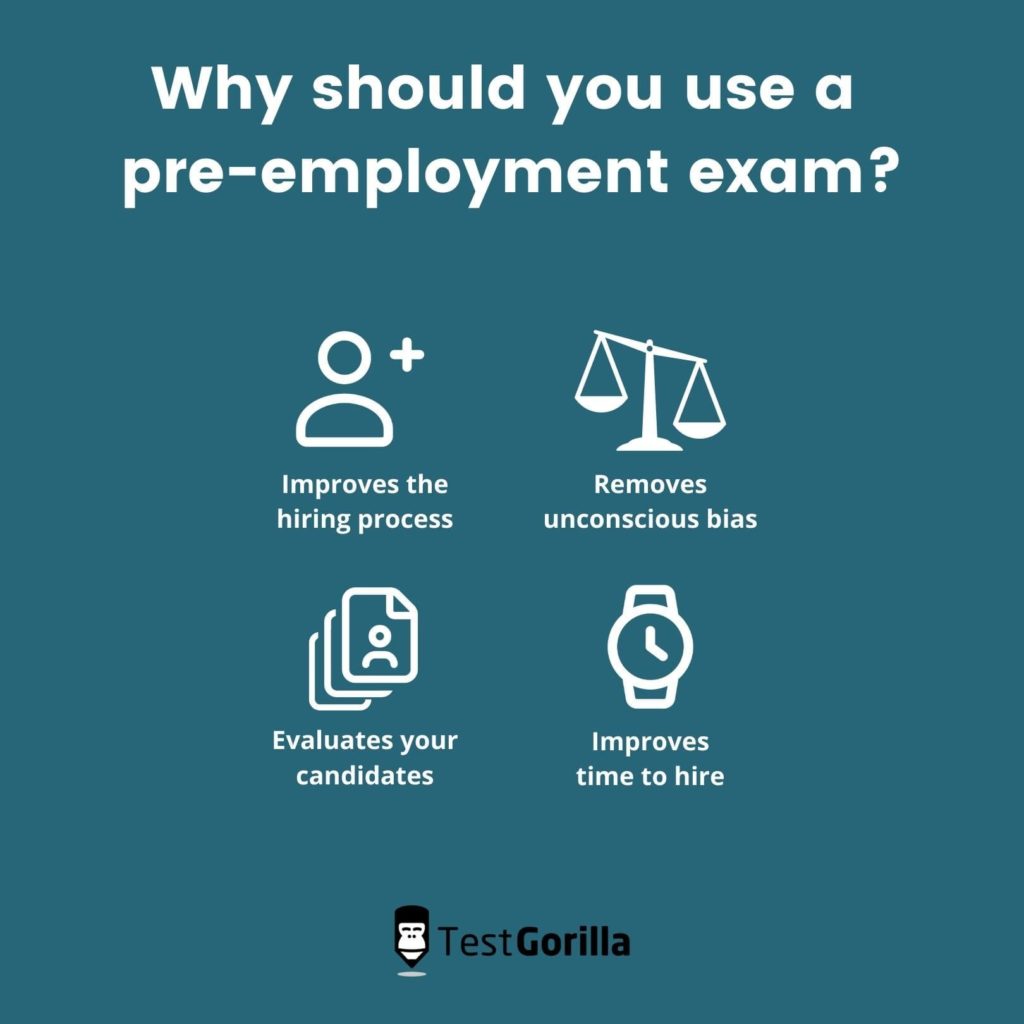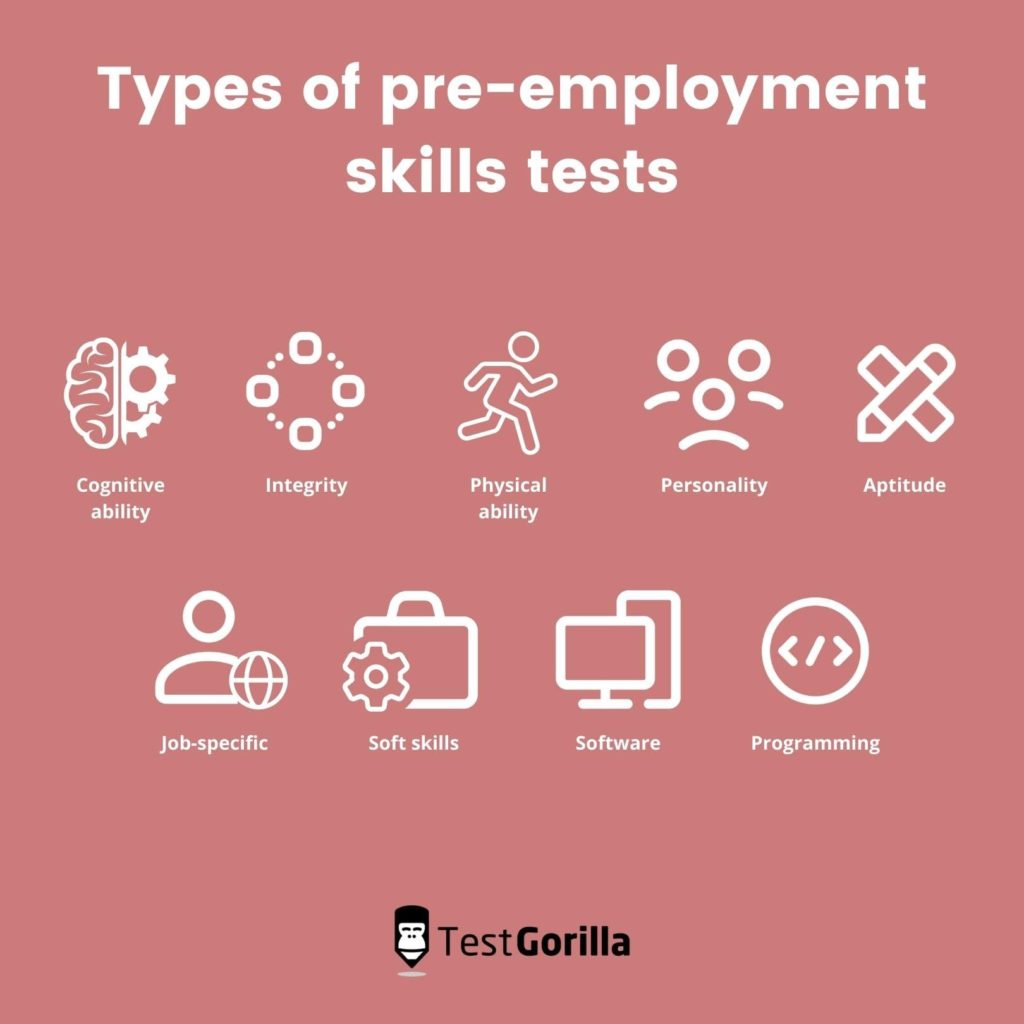Did you know that the average corporate job opening gets around 250 job applications?
Fifty years ago, that number was way smaller, and the HR manager could easily go through the CVs by hand and filter out candidates.
Today, that’s almost impossible. It’s no wonder the average CV gets viewed for only seven seconds. You simply can’t give every candidate a lot of your time and attention. But by trying to quickly go through all those CVs, you lose out on some great candidates because their resumes didn’t catch your attention.
The only way to ensure that you don’t miss out on any great candidates is to give them a pre-employment exam before you even start screening CVs. This will give every candidate a chance to prove their worth and ensure that you don’t make a hasty decision based on seeing their CV for a couple of seconds.
Table of contents
What is a pre-employment exam?
A pre-employment exam or test is an objective and standardized way for you, as a recruiting manager, to gather relevant information about candidates during the hiring process.
There are different types of pre-employment exams, but all of them have one thing in common — they collect the same data from all the candidates and provide you with the objective metrics you can use to compare them.
They make your job as a hiring manager easier because they attach objective (and usually numerical) values to every single candidate.
If your candidates Mark and Anthony both do the same test, the test result will provide you with the answer on who is more qualified. If Mark scored 76% and Anthony scored 89%, you will have a clear way of measuring the impact of your pre-employment exam and be able to make an informed, data-driven decision about who the more qualified candidate is.
Why should you use a pre-employment exam?
There are multiple reasons why you should use a pre-employment exam, but the following three have the biggest impact on your workplace:
1. Improves the hiring process
Your hiring process should be ever-changing, and you, as the HR manager, should constantly be working on improving the process. By using pre-employment exams at the top of your hiring funnel, you can almost effortlessly screen out unqualified candidates and focus your attention on the best candidates for the job.
2. Removes unconscious bias
As humans, we are all prone to biases and it can be extremely difficult to remove every unconscious bias wherever humans are involved in the hiring process.
A pre-employment exam will improve your hiring process by giving you an objective, bias-free way of evaluating your candidates and give you quantifiable, numerical values as results.
3. Evaluates your candidates
It’s really hard to assess which candidates are qualified for your open role and which have just “spam sent” their CVs for hundreds of different positions. An ATS can scan candidates’ CVs, but the software will use keywords to find the relevant candidates.
Sometimes, an ATS will reject a really good candidate because they didn’t insert a certain keyword in their resumes.
A pre-employment exam doesn’t have this problem — it will provide all candidates with the opportunity to verify the claims in their resumes, and you will receive data-driven results you can use to verify whether candidates are qualified.
4. Improves time to hire
A pre-employment exam is a scalable option. It doesn’t matter to you if you have 50 or 500 applications for your open role — you simply send the test with a single click and wait for the results.
The average test on our platform lasts for ten minutes, so you can get all of the candidates’ results within an hour. After that, you can move the qualified candidates who had a good score further into the hiring process and filter out unqualified candidates based on their test scores.
All of this speeds up your hiring process and improves your time to hire.
Types of pre-employment exams
There are three major types of pre-employment exams: job simulations, job trials, and pre-employment skills tests.
1. Job simulations
Job simulations are usually done during the interview phase of the hiring process. A job simulation is an evaluation tool with which you ask your candidates questions related to specific problem scenarios and how they would approach them and come up with solutions.
One of the most famous job simulations is called “The Kobayashi Maru” scenario, which is based on a scene from Star Trek. In it, the commander of the ship, James Kirk, took a training exercise in which he had to decide whether to violate a treaty by rescuing a civilian ship or to abandon the ship to avoid starting a war.
The scenario tests candidates’ ability to deal with loss and be an ethical leader in the face of despair rather than to try and find a flawless situation.
A job simulation allows you to assess if your candidate is ready for the job by evaluating their preparation and solution orientation. This can be a highly valuable assessment tool when combined with other pre-employment exams.
2. Job trials
A job trial is a pre-employment exam that hiring managers use to evaluate the candidate by having them work on the job itself. It can last from a couple of hours to a couple of days.
In a job trial, you insert the candidate in the working environment they will be working in if they are hired, and then you observe how they operate in it.
This can be complicated when dealing with jobs that require training to start becoming operational, but it’s a great way to evaluate blue-collar workers.
Usually, you don’t give out job trials early in the hiring process because that would stifle it — imagine 25 candidates running around the office or shop floor, trying to work on something.
Instead, reserve the job trials for later in the hiring process, when you only have a couple of candidates left and can safely track and assess their behavior during the trial without them disturbing other employees during the process.
3. Pre-employment skills tests
And last, we have pre-employment skills tests. These aren’t just used for white-collar workers — you can use them for blue-collar workers as well. In our test library, we have tests for blue-collar workers, such as:
You should use pre-employment skills tests during the hiring process, usually as the first step, even before CV screening. There are multiple types of pre-employment skills tests:
1. Cognitive ability tests
Pre-employment cognitive ability tests are meant to evaluate the candidate’s thinking abilities, such as problem-solving, verbal and numerical reasoning, spatial intelligence, and reading comprehension.
Cognitive ability tests are used to measure the candidate’s mental processes when they are dealing with problems that might happen in the workplace.
Three cognitive ability tests that you could give to your candidates are:
2. Integrity tests
Integrity tests are specific types of tests that assess the candidate’s honesty, trustworthiness, and dependability. Candidates who score low on these tests might be prone to risky behaviors, such as sabotage, absenteeism, theft, and even physical violence.
Integrity is a crucial trait in the workplace, especially for C-level executives and roles that deal with law and finances.
Three integrity pre-employment tests that you could give to your candidates are:
3. Physical ability tests
A physical ability test evaluates the candidate in a way that replicates the physical demands of a job role as closely as possible. The test tries to show you the employee’s capacity to perform physically challenging tasks that are required for the role.
Roles such as firefighters, law enforcers, and military positions require a physical ability test.
Two pre-employment tests that you could give to your candidates are:
4. Personality tests
Personality tests assess the candidate’s personality and character to determine what type of personality they have, what other types they get along with, and what role they are best suited for based on their profile.
Three personality tests that you could give to your candidates are:
5. Aptitude tests
Aptitude tests are exams that you use to determine the candidate’s ability to succeed in a given activity. They reveal the candidate’s strengths, weaknesses, and natural inclinations based on their inner characteristics.
Three aptitude tests you can give to your candidates are:
6. Job-specific tests
We at TestGorilla have a category for pre-employment skills tests called job-specific tests. This category provides specific tests that are only required for certain roles, such as electricians, marketers, or programmers.
Three job-specific tests that you could give to your candidates are:
For an electrician: Fundamentals of Electricity test
For a marketer: Facebook Advertising test
For a programmer: QA/Test Engineer test
7. Soft skills tests
Soft skills tests evaluate the candidate’s emotional intelligence and productive personality traits. The skills in this category can be grouped into social, communication, language, and emotional skills.
Five soft skills tests that you could give to your candidates are:
8. Software tests
Software pre-employment exams evaluate the candidate’s ability to use specific applications and/or software. The tests assess if the candidate knows how to set instructions in specific software to retrieve data and results from the operational tasks, scripts, and programs.
Three software pre-employment tests that you could give to your candidates are:
9. Programming tests
Programming pre-employment tests help you evaluate a candidate’s ability to code in programming languages such as Python, PHP, C#, or JavaScript.
Three programming pre-employment tests that you could give to your candidates are:
Why you should use TestGorilla’s pre-employment tests
Once you’ve decided to use pre-employment exams as a part of your hiring process, it’s time to decide which employee assessment software to use. Not all assessment software is the same, and here’s why TestGorilla is the best choice:
1. Custom questions
The platform is highly customizable and enables you to create your own questions.
2. Made by subject-matter experts
All of our tests are made by subject-matter experts. First, a subject-matter expert creates the test, and then another subject-matter expert tests and gives feedback on it. Then the test goes through multiple iterations until it’s finally ready, and only then do we put it on our Test Library.
3. Objective and bias-free scoring
The results from our tests are quantifiable (numerical), objective, and bias-free, so you won’t have to worry about multiple biases that can impact the hiring process.
4. Can be used for blue-collar job testing
Our tests aren’t just for white-collar workers — we have tests suited for evaluating blue-collar employees as well.
Use pre-employment exams to hire the best candidates
Pre-employment exams enable you to recruit the best people. They are scalable, objective, and bias-free. You can use them to test out all candidates as the first step in the hiring process so that you don’t miss out on any great candidates in the CV-screening stage.
Our pre-employment exams are also useful for blue-collar jobs. If you want to read more about assessments for blue-collar jobs, we suggest you read our guide to pre-employment assessments for blue-collar jobs.
With TestGorilla, you’ll find the recruitment process to be simpler, faster, and much more effective. Get started for free today and start making better hiring decisions, faster and bias-free.
Related posts
Hire the best candidates with TestGorilla
Create pre-employment assessments in minutes to screen candidates, save time, and hire the best talent.
Latest posts
The best advice in pre-employment testing, in your inbox.
No spam. Unsubscribe at any time.

Hire the best. No bias. No stress.
Our screening tests identify the best candidates and make your hiring decisions faster, easier, and bias-free.
Free resources
This checklist covers key features you should look for when choosing a skills testing platform
This resource will help you develop an onboarding checklist for new hires.
How to assess your candidates' attention to detail.
Learn how to get human resources certified through HRCI or SHRM.
Learn how you can improve the level of talent at your company.
Learn how CapitalT reduced hiring bias with online skills assessments.
Learn how to make the resume process more efficient and more effective.
Improve your hiring strategy with these 7 critical recruitment metrics.
Learn how Sukhi decreased time spent reviewing resumes by 83%!
Hire more efficiently with these hacks that 99% of recruiters aren't using.
Make a business case for diversity and inclusion initiatives with this data.





















